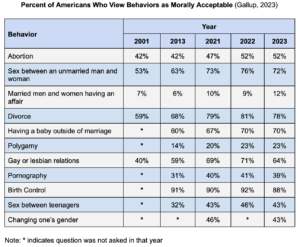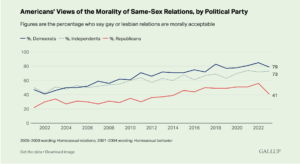Since 2001, Gallup collects data every month to gauge public opinion on various issues. For their conduct Social series interviews (ie, their monthly data collection process), the researchers call at least 1,000 US adults and ask them telephone interview questions, with the sample weighted to match the overall US population in terms of sex, age, race, and other key demographics; factors. Each May, these interviews focus on Values and Beliefs, which include moral attitudes toward a variety of sexual behaviors. You can read the full report of their findings herebut I got closer look at the data in order for this post to provide insight into how attitudes towards sex have changed from 2001 to 2023.
The table below represents the percentage of respondents who believe that each behavior is morally acceptable at different times. We have included columns for 2023, 2022 and 2021 to show the change in attitude over the last three years of data collection. We also included 2013 to provide a benchmark for behaviors ten years ago. Finally, we included 2001, the first year the survey was conducted, as a benchmark of 20+ years ago.

From 2001 to 2022, Americans’ sexual attitudes and values generally became more liberal across the board. This year, however, he bucked the trend. We won’t know until next year whether this was a temporary blip or the sign of a steady trend, but the results show a reversal in some sexual attitudes.
One of the most surprising results from this year’s survey is that attitudes toward acceptance of gay and lesbian relationships actually have decreased with seven percentage points from 2022. This is a worrying setback in public opinion that reflects the growing political backlash against LGBTQ+ rights. After two decades of Supreme Court decisions that rapidly expanded rights for LGBTQ+ people (including overturning sodomy laws, expanding the right to same-sex marriage, and providing some protections from discrimination), some erosion has begun. For example, earlier this year in the case 303 Creative LLC v. Eleni, 21-476the Court ruled that anti-discrimination laws protecting LGBTQ+ people cannot be applied to businesses that provide “expressive services”.
A further analysis of the data reveals that this trend is largely a reflection of falling Republican support. The chart below from Gallup shows that just 41% of Republicans today believe that gay and lesbian relationships are morally acceptable, which is decreased by 15 percentage points (from 56%) in the last year. This is a significant drop in a short period of time. Although there was a small decrease among Democrats as well, it is small enough to be within the margin of error. Dr. Lehmiller predicted that this moral divide between the political parties would deepen in last year’s post about the Gallup Values and Beliefs survey, and that seems to be the case. Quickly.

Image credit: Gallup, 2023
Apart from attitudes towards gay and lesbian relationships, the moral acceptance of sex between singles and women, divorce, pornography, birth control, sex between teenagers and gender reassignment also fell from last year, although changes were small. Overall, however, they are not surprising in light of broader policy trends involving increasing restrictions contraception, access to pornographyand access to gender-affirming care;.
As in previous years, a majority of Americans today believe that teen sex and pornography are morally unacceptable. However, the moral acceptance of these two behaviors has still increased by 11% and 8% over the past ten years, respectively. This overall trend may reflect how common these behaviors are. despite all these, most people have sex as teenagers and most people use porn at some point.
The moral acceptance of abortion, having a baby out of wedlock and polygamy (a form consensual-non-monogamy) remained the same from 2022 to 2023.
The only behavior that saw one increase in moral acceptance in the past year are married men and women who are in a relationship (also known as non-consensual non-monogamy or cheating). Although Americans overwhelmingly disapprove of infidelity, the number who say it is morally acceptable has actually doubled in the past decade (from 6% to 12%). This trend can be linked to increased popularity of open relationships among Americans, despite the fact that cheating is against the principles of consensual non-monogamous relationships (if you need advice on how to talk to a partner about opening up, we suggest you listen this podcast episode).
Although moral beliefs about sexual behaviors remain more liberal than they were 20 years ago, results from Gallup surveys over the past three years show that things have started to move in the opposite direction. While we cannot predict the future, these results suggest that the partisan divide on beliefs about sex, gender, and reproduction is likely to widen further in the coming years, and that political debates about LGBTQ+ rights, reproductive freedom and sexual autonomy will be enhanced.
Want to know more about Sex and Psychology? click here for more from the blog or here to listen to the podcast. Follow along Sex and Psychology on FacebookTwitter (@JustinLehmiller), the Reddit to receive updates. You can also follow Dr. Lehmiller in YouTube and Instagram.


